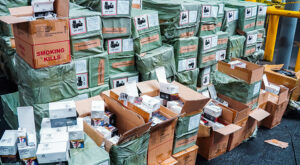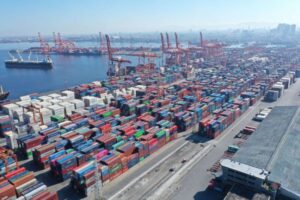-
The Department of Finance has shared its five main strategies aimed to put an end to smuggling and illicit trade, with digitalization playing a central role
-
Called Brave Strategies for Revenue Operations or BRAVE, the strategies bolstered by digitalization include projects by DOF-attached agencies Bureau of Customs and Bureau of Internal Revenue
-
Projects and initiatives include implementation of Administrative Order No. 23, Ease of Paying Taxes Law, Tax Compliance Verification Drive, seizure activities, and consultations with private stakeholders
The Department of Finance (DOF) has shared its five main strategies to put an end to smuggling and illicit trade, with digitalization playing a central role.
Called Brave Strategies for Revenue Operations or BRAVE, these strategies bolstered by digitalization “will drive our initiatives to improve efficiency, transparency, and accountability,” DOF Revenue Operations Group (ROG) undersecretary Charlito Mendoza said during the recent National Anti-Illicit Trade Summit hosted by the Federation of Philippine Industries.
BRAVE consists of B – border security enhancement, R – revenue collection and revenue-base protection, A – adaptive regulations and compliance monitoring, V – vigilant enforcement operations and vigorous intelligence gathering activities, and E – effective engagement with stakeholders and inter- agency cooperation.
On border security enhancement, DOF cited Administrative Order (AO) No. 23, which orders the Bureau of Customs (BOC) to implement pre-border technical verification and cross-border electronic invoicing of all imported commodities.
DOF said AO 23, which was signed last May, will strengthen national security, safeguard consumer rights, and protect people against substandard and hazardous imported goods.
DOF said it is finalizing the joint administrative order that will lay out the implementing rules to carry out AO 23, simplify customs procedures, and expedite the inspection of all imported goods in the Philippines.
The project is in line with BOC’s initiatives on pre-arrival, arrival, and post-arrival of imported goods, which also include the strict implementation of the Certificate of Registration for all importers, exporters, and brokers; and the fuel-marking system to mark and trace duties-paid fuel imports.
DOF also noted BOC’s x-ray inspection to expedite the clearance of goods and enhances the bureau’s capability to detect contraband; and the exercise of the inspection and visitorial powers of the Commissioner to scour local markets for smuggled goods.
On revenue collection and revenue-base protection, DOF said it assures that the government is on track to meet its revenue target for the year as sound revenue measures and anti-smuggling and anti-tax evasion measures are being continuously implemented.
With the recent passage of Republic Act No. 11976 or the Ease of Paying Taxes (EOPT) Law, taxpayers can now file and pay their taxes through any accredited payment channel, digital platform, or authorized-agent banks anytime and anywhere in the country.
Moreover, the Bureau of Internal Revenue (BIR) has been strictly implementing its Tax Compliance Verification Drive to determine legitimate businesses; the Oplan Kandado to ensure proper value-added tax compliance; and has visited over 112,000 businesses and collected over P250 million in tax penalties.
On adaptive regulations and compliance monitoring, DOF said its revenue-collecting agencies have been continuously updating and adapting rules to address emerging economic opportunities, threats to legitimate trade, and compliance challenges in excise taxation and customs duties.
For instance, BIR has tightened regulations and monitoring for excisable products through updated rules like Revenue Regulation No. 14-2022, which regulates the online trading of vapor products on e-commerce platforms.
Based on Revenue Memorandum Circular No. 59-2024, BIR now requires all vape products sold in the market to have internal revenue stamps in order to determine which have not paid the required excise tax. Importers and manufacturers of vape products must order internal revenue stamps via its Internal Revenue Stamp Integrated System (IRSIS).
On the other hand, BOC is integrating the customs declaration into the e-Travel System, allowing departing and arriving passengers to complete their customs baggage declaration and currency declaration forms electronically for faster and heightened security.
On vigilant enforcement operations and vigorous intelligence gathering activities, DOF cited BOC’s seizure activities, which had already resulted to the seizure of almost P19 billion-worth of counterfeit goods; over P13 billion-worth of smuggled general merchandise; and over P5 billion-worth of cigarettes and tobacco products in just the first half of this year.
Additionally, over P2 billion-worth of illegal drugs have been intercepted and seized.
Through its Bureau’s Action Team Against Smugglers, BOC also conducts profiling, case build-ups, and filing of administrative and criminal charges against violators.
Meanwhile, BIR’s Run After Fake Transactions (RAFT) initiative uses advanced mathematical modeling to develop a proprietary risk-assessment system to pinpoint sellers and buyers of ghost receipts.
RAFT has successfully sent over 1,500 assessment notices, collected over P1.3 billion additional taxes, and filed 24 cases against ghost sellers and buyers.
On effective engagement with stakeholders and inter-agency cooperation, DOF said both BIR and BOC have institutionalized their respective Industry Consultative and Advisory Councils.
Through CICAC, the agencies hold regular consultations and briefings with industry stakeholders to update them on regulations and gather feedback, ensuring full transparency and cooperation.
One of the projects borne out of these consultations is the recently launched Swift Corporate and Other Records Exchange (SCORE) Protocol––a web portal that allows the Securities and Exchange Commission to share its electronic database of corporate records with partner regulatory and enforcement agencies to boost bureaucratic efficiency.
Another is the full implementation of the Convention on Temporary Admission (Istanbul Convention), also known as ATA, an international scheme that allows the temporary admission and tax-free and duty-free importation of commercial samples, professional equipment, and articles for presentation or use in trade fairs, shows, and exhibitions. DOF said this program will help showcase Filipino-made products globally and provide wider access for local businesses to leverage opportunities in foreign markets.
Mendoza encouraged fellow government and industry partners to further intensify collaborative efforts to fight against smuggling and unfair trade practices.









